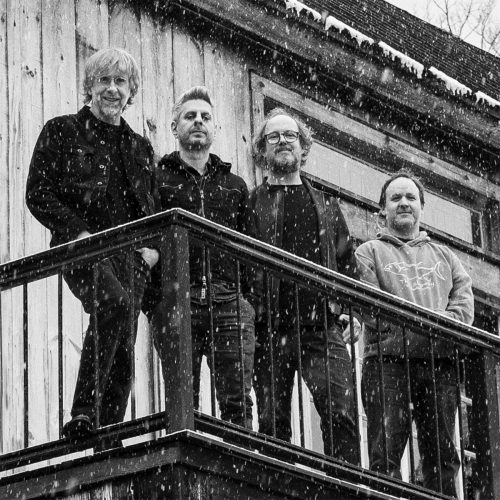Rock Album Review: Phish — Comfortably Optimistic at Home
By Paul Robicheau
Sigma Oasis is one of Phish’s better albums since the group reunited in 2009 after a five-year breakup.

Cover art for Phish’s Sigma Oasis. Photo: Rene Huemer.
As music fans diligently streamed past and current concerts at home under the coronavirus shutdown, Phish dropped a surprise with the April 2 digital release of Sigma Oasis, the band’s 15th studio album. All nine of its songs are familiar to fans who’ve have kept track in recent years, the last of its two tunes debuting at shows in December. Yet guitarist Trey Anastasio, bassist Mike Gordon, keyboardist Page McConnell, and drummer Jon Fishman weren’t planning to make an album when they convened last November at their Vermont barn studio to rehearse for a fall tour. Nonetheless, they got to talking about newer songs they hadn’t recorded.
Anastasio suggested calling in Vance Powell, who engineered and mixed the guitarist’s 2019 album Ghosts of the Forest, which also featured Fishman. And Phish set up in the rustic space much like they do onstage — eschewing room dividers or click tracks — to start with live takes of those songs with Powell (who’s also worked with Jack White and Chris Stapleton) as co-producer.
The result is one of Phish’s better albums since the group reunited in 2009 after a five-year breakup. Reflecting its casual cover photo of the old college friends on the barn’s snowy balcony, Sigma Oasis shares an organic feel, earthy sound, and relaxed focus that stands in contrast to their eclectic if uneven efforts Big Boat (2016) and Fuego (2014), both made with slicker producer Bob Ezrin.
While those albums included songs written and sung by other band members, Sigma Oasis draws entirely from Anastasio’s well, following his ambitious GOTF album (which, like Big Boat, even touched on grief for loved ones lost to cancer). There was also 2018’s silly diversion I Rokk, a live release of Phish’s Halloween set as the mock Scandinavian band Kasvot Vaxt. After all of that, Sigma Oasis comes across like a comfortable exhale, floating optimism that fits our tough times.
Lyrics often cast coincidental meanings to people facing different circumstances. Of course, Phish wrote and recorded these songs before the coronavirus was in the air. Still, it’s eerie to hear Anastasio sing “Take off your mask, the fear’s an illusion” in the title track, “Someone’s always telling me to breathe” in “Leaves” (which sounds like older song “Free” during its refrain of “breathe”), and “When darkness stains the Eastern sky, be sure that you are home” in “Evening Song.”
More people listen to Phish for improvisatory highs rather than lyrics though, and a 12-minute version of concert launchpad “Everything’s Right” centers the album. There are earworm platitudes in “This crazy world I know, it turns, it turns, and the long night’s over and the sun’s coming up.” But much like it does live, the song slips into a seven-minute jam that unfurls with a serpentine guitar melody, then deep bass and organ notes as Anastasio nuzzles into envelope-filter tones.

Phish — Trey Anastasio and Jon Fishman in 2019. Photo: Paul Robicheau.
Darkness also creeps in with the slinky lurch of “Steam,” its title word eliciting the same pressure-valve hiss that cues stage fog at shows. “Mercury” dissolves into a ghostly MIDI marimba passage by Fishman. And the 11-minute closer “Thread” shifts into one of Phish’s most interesting (i.e., proggy) recent numbers, briefly evoking Jethro Tull with its cascading rhythmic accents and McConnell’s squiggly synth sounds before the labyrinthian song folds in on itself.
But that’s one side of Anastasio’s world, as Trey the balladeer emerges on a few other tracks crafted with writing partner Tom Marshall. Graced by a string sextet arranged by Don Hart, the piano ballad “Shade” sounds more like early Elton John than a jam-band. It’s a nice song if you can get past wince-able lyrics like “I love your hair in the mornings, you know. You love to run wild and let the mane flow.”
Fortunately, Anastasio also shows growth as a singer in the studio, much as he did on Ghosts of the Forest, aided here by the vocal production and arrangements by Raab Stevenson, who subtly utilizes overdubbed backup singers beyond the band members. That’s most evident in the vulnerable “A Life Beyond the Dream,” a song that Anastasio first debuted on tour with GOTF. It resurfaces on Sigma Oasis with a soulful tinge of classic rock, building to strings-sweetened grandeur behind its chorus of “Don’t give up hope, don’t give up hope, keep dreaming.”
Over its 30-plus years of evolution, Phish has stretched itself musically, vocally and emotionally with a fair share of awkward naivety. And the group’s songs usually reach their potential onstage rather than in the studio. But Phish sounds at home on Sigma Oasis, and that measure of comfort and positivity seems right now.
Paul Robicheau served more than 20 years as contributing editor for music at The Improper Bostonian in addition to writing and photography for Rolling Stone and the Boston Globe, where he covered Phish from small halls to the band’s huge, pioneering ’90s festivals.
Tagged: Jon Fishman, Mike Gordon, Page McConnell, Paul Robicheau, Phish, Sigma Oasis
